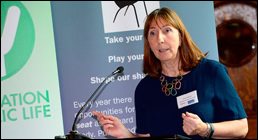
Blog article by Naomi Roberts on women's participation in public life
Women’s Participation in Public life in Northern Ireland
New research launched by the Institute of Peace Studies calls for the Northern Ireland Executive to put in place measures to enable and encourage women’s participation, is to be welcomed.
Women make up just over 50% of our population yet we know their participation in public is not representative of this figure. This new discussion initiates new research on women’s experiences of risks, harms and barriers as a result of their involvement in public life.
What do we want from women in public life?
Unfortunately for women in Northern Ireland, we know that the research and public discussion highlights security issues and threats that women leaders in the community, justice and security sectors have encountered from their participation in peacebuilding before, during, and after the Good Friday Agreement – just knowing this is a possible consequence could put many talented women off considering a role in public life.
So what do we want women to do? We want them, we need them to participate in public life. We want them to contribute to public decision making, we want them to sit on boards - from those in their local community and voluntary organisations to the government appointed boards such our own board here in the Equality Commission.
We also need their participation in political life, e.g. as political representatives; members of political fora at various levels, political party members, councillors, MLAs and MPs.
Why is women’s participation in public life important?
We know that diversity on boards improves decision making, which ultimately benefits us all. Where female participation is lacking, the amount of knowledge, experiences, and potential viewpoints which may contribute to a board of a public body, or any decision-making process may be limited.
Through our work on key inequalities, the Equality Commission has continued to support and promote the need for increased diversity in political and public life. There have been calls for actions to advance the participation of women and people with disabilities in public life from across civic society and we continue to work with the Commissioner for Public Appointments for Northern Ireland to this end.
But this will not change overnight, we all have a role to play. Engagement with under-represented groups to raise awareness of the potential benefits for individuals and society is vital. This will help to overcome actual or perceived personal barriers to participation, this work must permeate all levels of society.
Barriers to women’s participation in public life
UN Security Council Resolution 1325 states that ‘Women’s participation is key to sustainable peace’ but today, women still continue to face barriers to participation in peace building and post conflict reconstruction, as well as in other areas of decision-making in Northern Ireland.
The finding of a 2014 Inquiry highlighted restrictions faced by women to participate in peace building and post conflict reconstruction, as well as in other areas of decision-making.
Restrictions include:
- Parents being unable to access appropriate childcare
- The high volume of male-dominated political institutions here in NI
- Pressures that ensure women’s voices are silenced in local communities.
It would be fair to assume that not much has changed in the last seven years, in fact with the advancement of digital technology and growth of social media, women appear now to experience or face sexist criticisms and abuse more than their male counterparts.
We continue to recommend Government action to ensure appropriate, flexible, accessible and affordable childcare provision, including through the implementation of an effective full Childcare Strategy and action plan.
The media plays a key role in conveying the male dominated nature of public life. Local, national news and social media publishing positive and supportive content, can have a profound impact on promoting positive public attitudes and encouraging representation. We have called for action across society to challenge stereotypes and prejudice.
So to conclude…
Addressing key inequalities will require action not only by government and relevant departments, but also by elected representatives / political parties and key stakeholders across society to promote equality in participation in public life.
There is no quick fix solution and we know that this will take time, effort and resources before we experience real change – but it is a change that is needed. More women in Northern Ireland must be encouraged to take up the mantle to participate in public life, to make this a better society for us all.
Posted on 09 Jul 2021 by
Naomi Roberts